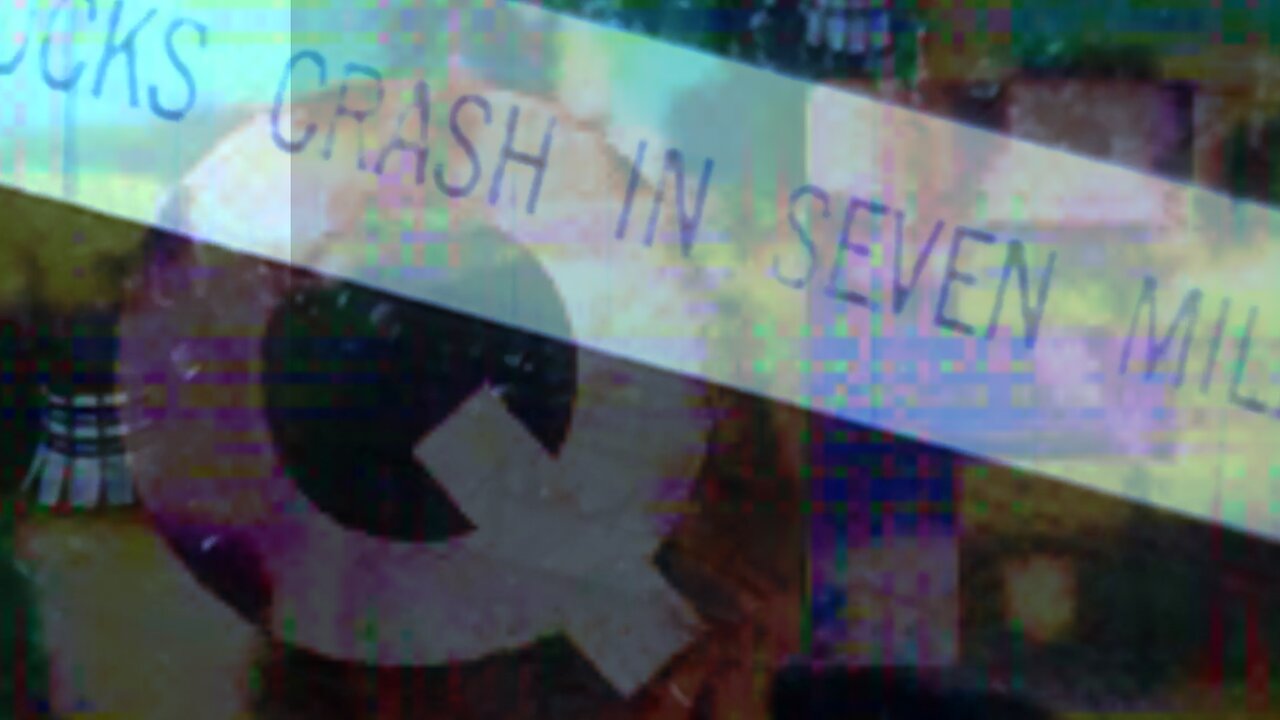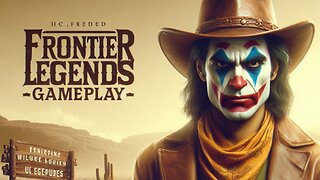Premium Only Content

Love is so much more fun than anything else
Such a summer crash passes quickly...
Artists: German-Austrian Sensitivity
Album: DÖF, Released: 1983, Genre: Pop
For 2,000 years, the earth has lived without love.
The Lord of Hate reigns.
Ugly, I'm so ugly, so horribly ugly:
I'm hate!
Hate, hate very ugly, I can't help it:
I am hate!
Attention, attention.
Unknown flying object approaching the planet.
Identify unknown flying object.
Codo the third, from the center of the stars I am the third from the left.
Unknown flying object identifies as: "Codo"
And I jet, jet, jet, jet at a rapid pace
and bring love with me from my ride to heaven.
Because love, love, love, love, it's a lot of fun,
much more fun than anything.
We do not need any love on this planet:
Kill Codo! Destroy love!
Target response: gamma, delta, seven, three, one, overspace.
Codo from the distance of the shining stars:
I love to jet through space.
And I jet, jet, jet, jet at a rapid pace
and bring love with me from my ride to heaven.
Because love, love, love, love, it's a lot of fun,
much more fun than anything.
Object overcomes the hate shield.
Caustic, I'm so corrosive, everything corrosive:
I am hate.
And I jet, jet, jet, jet at a rapid pace
and bring love with me from my ride to heaven.
Because love, love, love, love, it's a lot of fun,
much more fun than anything.
And I jet, jet, jet, jet at a rapid pace
and bring love with me from my ride to heaven.
Because love, love, love, love, it's a lot of fun,
much more fun than anything.
And I jet, jet, jet, jet at a rapid pace
and bring love with me from my ride to heaven.
Because love, love, love, love, it's a lot of fun,
much more fun than anything.
Which: Musixmatch
Songreiter: Annette Humph / Joseph Prokopetz / Manfred Tauchen / George Janszewski
Codo © Gloria Musikverlag Kg Hermann Schneider Lyrics
Songtext von DÖF - Codo Lyrics
Seit 2.000 Jahren lebt die Erde ohne Liebe.
Es regiert der Herr des Hasses.
Hässlich, ich bin so hässlich, so grässlich hässlich:
Ich bin der Hass!
Hassen, ganz hässlich hassen, ich kann's nicht lassen:
Ich bin der Hass!
Attention, attention.
Unknown flying object approaching the planet.
Identify unknown flying object.
Codo der dritte, aus der Sternenmitte bin ich der dritte von Links.
Unknown flying object identifies as: "Codo"
Und ich düse, düse, düse, düse im Sauseschritt
und bring' die Liebe mit von meinem Himmelsritt.
Denn die Liebe, Liebe, Liebe, Liebe, die macht viel Spass,
viel mehr Spass als irgendwas.
We do not need any love on this planet:
Tötet Codo! Vernichtet die Liebe!
Zielansprache: Gamma, Delta, sieben, drei, eins, Überraum.
Codo aus der Ferne der leuchtenden Sterne:
Ich düse so gerne durchs All.
Und ich düse, düse, düse, düse im Sauseschritt
und bring' die Liebe mit von meinem Himmelsritt.
Denn die Liebe, Liebe, Liebe, Liebe, die macht viel Spass,
viel mehr Spass als irgendwas.
Objekt überwindet den Hassschirm.
Ätzend, ich bin so ätzend, alles zersetzend:
Ich bin der Hass.
Und ich düse, düse, düse, düse im Sauseschritt
und bring' die Liebe mit von meinem Himmelsritt.
Denn die Liebe, Liebe, Liebe, Liebe, die macht viel Spass,
viel mehr Spass als irgendwas.
Und ich düse, düse, düse, düse im Sauseschritt
und bring' die Liebe mit von meinem Himmelsritt.
Denn die Liebe, Liebe, Liebe, Liebe, die macht viel Spass,
viel mehr Spass als irgendwas.
Und ich düse, düse, düse, düse im Sauseschritt
und bring' die Liebe mit von meinem Himmelsritt.
Denn die Liebe, Liebe, Liebe, Liebe, die macht viel Spass,
viel mehr Spass als irgendwas.
Quelle: Musixmatch
Songwriter: Annette Humpe / Josef Prokopetz / Manfred Tauchen / Georg Janoszewski
---
The lyrics are about a spacefaring star dweller who comes close to Earth, named Codo, which according to Joesi Prokopetz is an abbreviation for "Cosmischer Dolm or Cosmischer Depp". For Inga Humpe, Codo was "an extraterrestrial being without a specific gender, who overcomes hatred and brings us stressed and negatively minded people everything we miss: good mood, wit, charm and above all love". Against the resistance of the "Lord of Hate", he brings forbidden love back to earth. Because of this plot, the song is also known as a science fiction parody. The refrain Ich düse, düse, düse, düse im SauseSchritt is sung by DÖF member Inga Humpe, who portrays the creature Codo in a glitter costume sitting on a swing in the music video.
Publication and success
On the B-side of the single is the 5:32 minute long language contributionNothing at all. There is also a 12-inchMaxi-Single, which is followed by a 5:11 minute long version ofCodo. Codoalso appeared on the albumDÖF, which sold over 500,000 copies in German-speaking countries. The single became a number one hit inGermany(five weeks),Austria,Netherlandsand inBelgiumand sold 1.2 million copies. Furthermore, there is aYiddish-English version under the nameCojdoj, the Flying Schisselon the B-side of the singleLove Me. TheGiG-Recordscovers are blue with white lettering, whichArtworktheWEA-Recordseditions comes fromManfred Deix. The melody of the title is based on a compositionHolger Biegesin theGDRback, the titleKiss me and love me, sung byGerd Christian. By chance, after fleeing the GDR in 1983, Biege learned that Annette Humpe had deliberately copied the melody and was even interested in theOssiswho couldn't do anything about such plagiarism anyway. For Biege, this was the reason for the plagiarism procedure. In the first instance he was found to be right, after appeal he rejected an appeal in the second instance.ComparisonOff.
Joesi Prokopetz (DÖF)
"Codo was just a slip in the entire program..."
Interview from 29 May 2007
The 80s included the Rubik's Cube, the Commodore 64 and a delicious Raider. But the 80s also included the Neue Deutsche Welle, and especially a musician like our guest today. Why? Because he was part of the formation "DÖF", which gave us a hit at the time that probably every child still knows today: "Codo". Not much is actually known about DÖF. They were there, had this super hit and were a group consisting of two Austrian men and two German women. That's it. But how did DÖF come about? What was the idea behind it and what has become of the gentlemen of this formation (we know it from the ladies in this country)? We explored all these questions and a few more in a conversation with Joesi Prokopetz on 29.05.2007...
________________________________________
Hello Joesi, and welcome...!
Yes, hello....
Many people in Germany who still know you from the past are wondering: "What is Joesi actually doing today?" ...
Today I do what I've always done. I was and still am an author with my own lecture. The fact that this developed to the point that a cabaret work, including the "Düse im Sauseschritt" and all the trimmings, became a megahit was in and of itself a pleasant and beneficial error, but nevertheless a mistake in a certain way.
If you look at your schedule for this year, you'll see that you're on the road with two different programs, right?
I'm even on the road with three different programs. There is the "Best Of" ("Prokobest", editor's note), "Views of a Clone", and there is also a "Special", where I perform songs such as "Codo", "Taxi" and a few other Austrian No. 1 hits with a guitarist, which I still had in a short but intense solo career at that time.
Can you tell your fans, who don't know the programs (yet), something about what you're bringing to the stage?
The "Best Of" goes virtually across the board through 10 years of stage programming. I tell various little stories there, e.g. my first visit to the urologist, my problem with a Playstation2 game that I've been playing for two years and why nothing goes on there, and so on and so on... in other words, different stories from different areas. The other program is the "Views of a Clone", where I slip into nine different roles to show that, depending on their social background, all people are the same and think the same (are cloned), i.e. that we live in a very uniformed society. The third program is the aforementioned "Special" with the songs from back then.
In December, there will be several dates under the title "Gemischter Satz". What is it all about?
The "Gemischter Satz" is a program, there is a little bit of everything. It is, so to speak, a "cauldron of color" from all three programs. There will also be a funny reading from my book "Hose runter". I was recently very successful with this in Carinthia, where German guests were also present at a very nice lake event when I read from the book. They had a very good time there during the program, and afterwards they also bought books in large quantities.
Behind each date is an "A" for Austria. Will you be seen again in Germany at some point?
I don't know yet. We are looking to make sure that with the new program, which will come in the fall of next year and will be called "Please don't shoot", we will perhaps get from Munich up to Stuttgart, and perhaps all the way up again to Lauenförde to the Dolce Vita Theater. The latter is a small theater where I was very successful for four days with a kind of "Gemischter Satz" and got good reviews. But a big tour of Germany is less beneficial in this case. They would have to be smaller houses, such as the "Lach und Schießgesellschaft" in Munich, where you play for a day or two.
Apart from your work as a cabaret artist, people also know you as a successful songwriter...
Yes, I have written a lot of successful texts for Wolfgang Ambros...
It is said that you invented Austro-Pop...
There is a lobby that claims that I invented it. I don't interfere in this discussion. That should be decided by the chroniclers and the musicologists. If that's the case, I'm glad. If it's not like that, it doesn't hurt me either. Whether I invented Austro-Pop or not doesn't really matter to me.
While we're on the subject, let's stay where it all began: What were Joesi Prokopetz's first steps in terms of music?
I actually come less from music... I come from the word. The whole music story then came along, it was more by chance, that I suddenly had to make music. I was and still am an author. The first thing I had to do with it was that I had written the lyrics to "Da Hofa" for Wolfgang Ambros. He then recorded the song and sold a lot of records. Then suddenly he was famous, and so was I. And then fate took its course.
What changed for you when said title suddenly became so successful?
I had just come out of high school when I wrote the title, and then I immediately became an author. Before that, I was nothing essentially different from a student. I wrote "Da Hofa" when I was 19, right after graduating from high school.
In 1974, "Der Watzmann ruft", a musical radio play and stage play, was created by you, Wolfgang Ambros and Manfred Tauchen. How did the idea come about and how was it ultimately implemented?
This came about as a result of a downright crazy idea. At that time, we talked in a constant role-play in this basic language, and then someone said: "Why don't you do something with the material? It's so funny and so good." Then we sat down and wrote "Watzmann" one night, with encouragement of high-proof liquor. It was only 20 minutes long at the beginning, it was more of a mini-drama with three or four songs. It only became such a huge thing later. It has grown and is still not finished. The "Watzmann" is a vessel into which you can pour all kinds of things that have the Watzmann basic theme as their leitmotif. It just happened that way back then, as I think that all great successes simply happen, and not through deadly serious thinking and construction.
What memories - positive as well as negative - do you have of this time and this musical project?
"The Watzmann is calling" was always funny. Whenever we played, the halls were full and the people were in a good mood. Even on the last tour, which took place mainly in Germany, we almost always had full houses, or arenas... In 2008 we will play "Watzmann" again 20 or 25 times in the original cast, as on this legendary successful tour of 2005, at the Luisenburg in Wunsiedel, also in Germany.
You then drew attention to yourself internationally with the group DÖF in 1983. How did DÖF come about?
DÖF was created when a resourceful record producer, Markus Spiegel, who also discovered Falco, said to us: "Do something, you're good". At that time we were young lads who didn't want to work much and only wanted to live the art of living. We just wanted to be artists. We then wrote something together and also recorded something and said: "That would be our idea". As a result, Der Spiegel said that it could not imagine anything and that it would have Annette Humpe flown in from Berlin. Before it came, we had to finish a demo tape very quickly. We recorded it at home on a cassette recorder with guitar. We thought to ourselves: "If she hears that, she'll go home right away anyway". She came, heard that, and laughed her head off. She said: "I think that's great, we'll do it". And that's how DÖF and the album came about, and "Codo" conquered the top 10 of the charts in almost all of Europe. That was - how do you say - a stroke of luck. That's something you can't repeat because it had such a momentum of its own that you can't create. I don't want to say it's a coincidence, it was... Luck.
... and Annette then brought Inga with her?
Exactly, she brought Inga with her, and Inga sang with us. We divided the work among ourselves, because music wasn't really our business. We put on the white tuxedos, and even had two managements - one in Austria and one in Germany. But this success was not extendable, and it cannot be repeated. Apart from that, after some time I no longer felt very connected to Mr. Tauchen, both personally and artistically
Now we would like to hear it from the mouth of one of the inventors himself: What does the abbreviation DÖF stand for?
It means "German Austrian sensitivity". Some say "German-Austrian friendship". That's logical and we wanted that, but at that time there was already the group "DAF", i.e. "German-American Friendship", and we didn't want to copy that. That's why we called it "German Austrian Sensitivity". But in the end it didn't matter, because everyone said "DÖF" anyway.
The single "Codo" took first place in the German single charts for five weeks in a row. How surprising was the success for you?
Totally surprising! When the record company decided to release "Codo" as a single, I said: "That's completely wrong! It's such a stupid and childish song, no one will want it and no one will play it." And that wasn't true. When the single was released, the radio programs were full of it, and the single has become an insane hit. You can't deny that this song is not very intelligent or soulful, but obviously it was just the right thing for the general public. Many people still speak to me today who loved the song back then when they were children and teenagers. You could also see that at our live concerts, that there were many young people there, although the DÖF program was otherwise not exactly tailor-made for children. "Codo" is more of a slip in the program, because the rest of the program is more cabaret-like.
"Codo" was then successful in several countries...
Certainly... we were in the top 10 in Scandinavia, quite high up in France, and also in Italy and Switzerland. For example, we were in the top 10 in Denmark for two or three weeks with the original version of "Taxi". We don't know why. Maybe "kummt net, kummt net" has a special meaning in Denmark, and we didn't know it. That was a curiosity in the euphoria at the time, but I think to myself today "Why was that in the top 10 in Denmark back then?" ... Nobody knows (laughs).
In the European radio play "Larry Brent" you can hear an instrumental version of "Codo" as background music. Did your song serve as a template here?
I don't know the radio play at all. "Codo" is a self-creation. There were even two copyright lawsuits, both of which we won. Sure, "Codo" serves as a template here, but I don't know anything about that.
The same question as with the "Watzmann" story: What memories - positive and negative - do you have of the DÖF time?
The DÖF time was very funny, especially because we were number 1 in Germany for so long and sold so much. If you sell a lot, the record company is of course very generous to you, then you go for a walk in a stretch limousine and get the red carpet rolled out, and everything... They are then very attentive to you. But that suddenly subsides when the second single doesn't sell as well as it was with us. In addition, at the end of this "Codo" success, i.e. when the single slipped from number 1 to number 5, it was foreseeable that the group would fall apart. I didn't get along with Mr. Tauchen in any way, and the girls didn't want to continue either, because it was a special project for them and they wanted to do something else. Another point was that there was no suitable succession idea. So it came about that the project has gently fallen asleep.
But there was a collaboration with Stefan Remmler before the end, right? Please tell us something about it.
Yes, that was an absolute flop. That was this single "Uh, uh, uh mir bleibt die Luft weg". The song wasn't particularly exciting and didn't sell well, so it didn't lure anyone out from behind the stove. That was practically the funeral song of DÖF, although Remmler did quite well.
Manfred Tauchen has released another LP under the name DÖF with the title "Tag und Nacht" (Day and Night)...
He even made two more LPs. However, the public knows nothing at all about the third record.
Instead, you started your solo career, and with the songs "Na guat, dann net" and "Sind Sie Single" you had two No. 1 hits in Austria...
Agrees. There was still a contract with the record company. It was not issued to the group, but to each individual. At that time I had said to the record company: "Oh, forget that. We will dissolve it by mutual agreement." But they wanted me to do something else, and as the devil would have it, I had two more No. 1 hits in Austria. Then there was the single "Der Trick mit dem Hüftknick", which also went quite well. But then came the time when "Austro-Pop" was cancelled in Austria for 10 years. He was only appreciated again when it was realized that he could not be killed after all.
Is there still contact between you and your former colleagues from DÖF?
No, not at all. Unfortunately, not to Inga and Annette. And where Tauchen lives now, I don't know and don't even want to know.
Since the 80s you haven't done any other work in the field of music, right?
Agrees.
On the other hand, you could be seen with various stage programs to this day. You have also worked as an author. Please tell us something about your last book "Hose runter".
My last book is a satire consideration of the hard-hitting Austrian reality of an unsubsidized, freelance artist. Like everything in Austria, the existence of a cabaret artist has two sides. This book takes a satirical look at how you drive from one performance venue to another in Austria and what you experience along the way. Both on the journey and at the performance venue itself. It is therefore also a foray into the Austrian soul, which is my favorite research project. I had the idea for this book because people always say I'm doing so well, I can sleep as long as I want, I can do what I want all day long and only have to do the Hans-Wurst for two hours in the evening. I get an insane amount of money for it, never-ending applause and the most beautiful women. The book mercilessly describes that all this is not so rosy and is associated with a lot of inconvenience and stress. It is satiated, therefore funny and by no means begging for pity. It sells quite well and everyone has liked it so far. I even got good reviews from people who don't usually want me that way.
Joesi Prokopetz the musician, Joesi Prokopetz the cabaret artist, Joesi Prokopetz the author... there has even been a foray into acting. Is there anything you have left out so far and would like to do?
No! It's not like I've struggled to do things along the lines of "I really want to act now" or "I really want to have a leading role in a play right now". I was offered it, and I was very happy to do it. It was also a lot of fun. I always got quite good reviews for my roles in the plays. In Austria there is this cultural summer every year, where Shakespeare is played in all kinds of villages, practically on every dung heap (laughs). But I also played at Lichtenstein Castle at the "Nestroy Festival". I've always enjoyed it very much, and I've also learned a lot from it, which I can use very well for my cabaret evenings. Cabaret is also acting, so the mouse doesn't bite off a thread. A cabaret artist who cannot act has fewer possibilities and stylistic devices of expression at hand. Someone who can only recite, not play and switch from one role to the next has a narrower communication repertoire than someone who can do that. And I learned a lot there and have used it so far.
An unpleasant time was the one when you fell ill with depression. How did you overcome them?
Yes, that wasn't nice at all. I have been symptom-free for eight years now, and I don't need to take any medication anymore. I seem to have overcome that. This disease is also curable. But there are also cases where this takes longer and where it is not so curable. For example, I had a pretty hard time. But by facing it, and with the help of medication and talk therapy, I got a grip on it, and was then successively cured.
And what did you take away from this difficult phase of your life?
That life is full of traps, fate is relentless and that the greatest successes are of no use at all if you are ill, e.g. have depression. Happiness is something that does not come exclusively from outside. Mainly it has to come from within.
What are your plans for the future?
I have to confess, I have no plans for the future and have never had any. I've never had big goals either. I always waited until the target found me. There are a lot of things that are in the air... there are plays in which I am supposed to play, and also one that I am supposed to write. If this is a goal that is supposed to find me, then it will find me. I'm not someone who somehow runs after it and makes career plans. I believe that something like this only leads to cramps and cramped products. So I wait until a director calls me and tells me "You play the role". But then it's also about whether these theatre stories also fit in with my cabaret dates. There are contracts that I can't just cancel. A play that I am doing with the director Frank Hoffmann is already in the works and will - God willing - premiere next March at the Stadthalle Wien.
That's it, we've come to the end of our interview. Would you like to say a few more words to our readers?
I would like to tell all readers to visit this page as often as possible (laughs). I send her greetings. If a reader has a question, he can write it in my guestbook via my homepage (www.prokopetz.at), and I will write back to him reliably.
Interview: Christian Reder
Photo: Autograph card (WEA)
https://tinyurl.com/yswrac46 (wkpda)
-
 7:04:37
7:04:37
MyronGainesX
23 hours ago $22.94 earnedCollege Debate Reaction, Jordan Peterson Sells Out, Shannon Sharpe Shakedown!
118K36 -
 2:01:49
2:01:49
Joker Effect
5 hours agoWE ARE IN THE WILDWEST! Frontier Legends is crazy!
29.3K -
 3:54:43
3:54:43
FrizzleMcDizzle
7 hours agoELDEN RING and I'm officially a creator on RUMBLE
38.3K1 -
 1:33:35
1:33:35
theoriginalmarkz
8 hours agoEvening News with MarkZ, joined by Jonathan Otto. 04/24/2025
84.7K6 -
 8:02:49
8:02:49
Lilpaul112
9 hours agoSolos On the Island / Repo Time With the Brrrap Pack Gang!
28.1K1 -
 3:56:48
3:56:48
GrimmHollywood
8 hours ago🔴LIVE • GRIMM HOLLYWOOD • REPO with the BRRRAP PACK • THEIR FIRST TIME PLAYING •
27K -
 4:37:00
4:37:00
Game On!
17 hours ago $2.54 earned2025 NFL Draft Live Coverage and Reaction!
41.9K -
 3:30:04
3:30:04
RamrodJenkins
9 hours agoOblivion Remastered! I am so excited to finally play this!
17.4K5 -
 7:33:34
7:33:34
Tommy's Podcast
8 hours agoE713: Lady Luck
30.4K1 -
 5:15:43
5:15:43
VOPUSARADIO
14 hours agoPOLITI-SHOCK! "Destroying The Narrative"! W/ 3 Special Guests
11.7K2